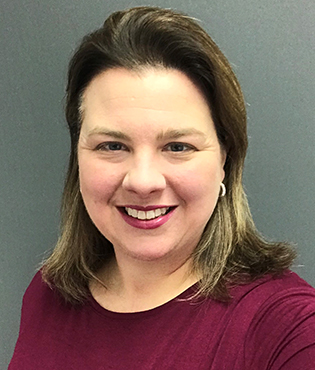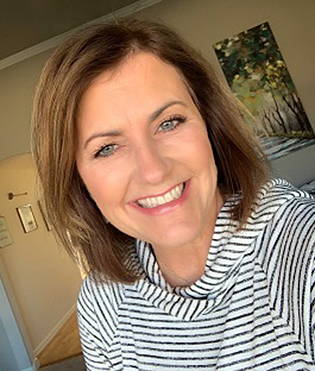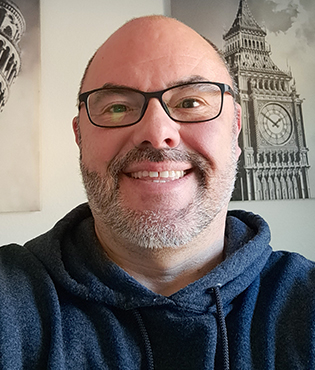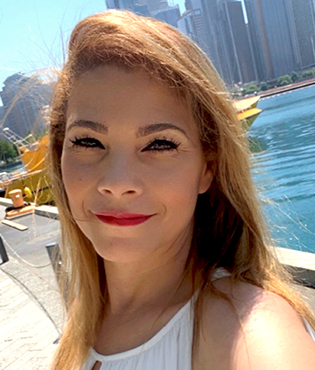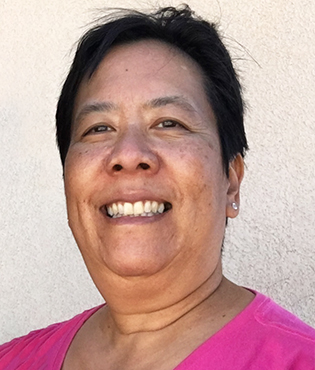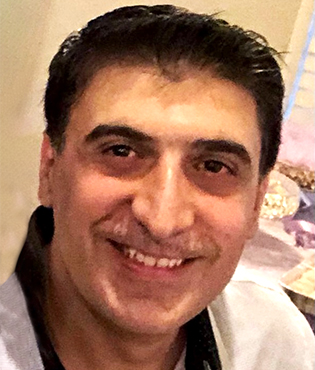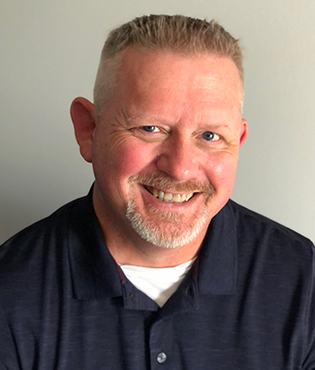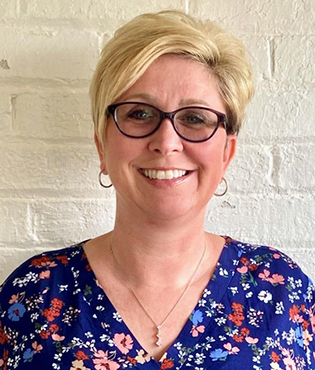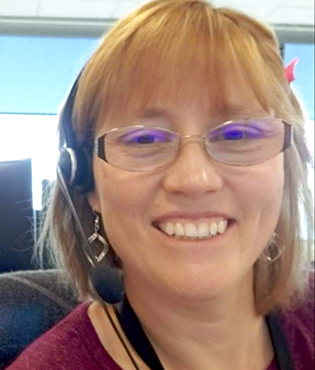How Our Nurses Support Care and Experience for Members
May 6, 2022
More than 2,000 nurse employees of Health Care Service Corporation (HCSC) and its plans in Illinois, Montana, New Mexico, Oklahoma and Texas help members get the care they need and improve their health. In recognition of Nurses Month, we honor our nurses for their empathy, compassion and commitment to our members.
Their experience is diverse. Many devoted decades of their lives working long shifts and countless nights, weekends and holidays caring for patients in clinical settings before transitioning to their jobs as case reviewers, care managers and care coordinators and other roles.
Here are a few of their stories.
Erika Tibbs
Medical Review Unit Nurse
Health Care Management
Every time her mother went to work for her nursing shift, Erika Tibbs wanted to go with her. As a teen, she became a hospital patient liaison and knew she’d found her life’s calling.
“It was the best job ever,” Tibbs recalls. “I got to help people. I really felt energized.”
Following in her mother’s footsteps,Tibbs became a nurse and worked 20 years at the same hospital —working as a floor nurse to case manager.
She remains as passionate about patient care now as a medical review nurse as she did as a hospital volunteer. In 2018, Tibbs joined HCSC, and, she says, “hit the jackpot.” In reviewing member cases, Tibbs believes she has more time to get to know her patients and their conditions despite never meeting them.
Her experience as a floor nurse was invaluable, but she typically rushed from patient to patient until her shift ended. “I’m doing meaningful work because I’m still making sure patients get what they need,” Tibbs says. “You touch people’s lives when no one else in the world can.”
Cathy Lambert
Utilization Management Coordinator
Health Advocacy Solutions
Cathy Lambert’s road to fulfilling her dream of becoming a pediatric nurse started with a 10-year detour recording and transcribing depositions and family court proceedings.
Difficult testimony and unreliable pay led her to follow her passion and return to school, becoming a nurse about 15 years ago. Lambert joined HCSC as a utilization management coordinator in 2019 after years working as a clinic pediatric nurse, in home health, and a brief stint in laser hair removal.
“Coming to HCSC was the best decision I ever made,” says Lambert, although she feared the transition from clinical work to case reviews. “I was afraid I wasn’t going to feel like a nurse if I was not touching people. But this is a dream come true.”
She works with providers to coordinate member care for needs such as hospital stays, elective surgeries and in-home physical therapy. Lambert enjoys the job because she’s learning new things about diseases, treatments and therapies, including those for cancer and cardiac care.
“Every day is a new person and a new story,” she says. “I treat them like my family member. I’m going to get what I need to review their case. I’m going to fight for you. I would want someone to do that for me.”
Scott Catone
Holistic Health Specialist
Health Advocacy Solutions
As one of HCSC’s newest nurse employees, Scott Catone looks forward to working with members, offering the empathy and support he’s always provided patients throughout his nearly 30-year career.
He also believes his own story of survival could offer members strength and encouragement as he helps them manage their health conditions and illnesses. In March 2020, as threat of COVID-19 infections kept Americans quarantined at home, Catone waited in a Dallas-area hospital for a heart transplant, which he received weeks later.
He shares his story because he knows it gives other people hope. The hospital recorded a video testimonial of Catone and his wife, which it plays on a TV screen.
“A patient at the hospital recognized me from the video and told me that they watch it all the time,” Catone says. “Nurses have to have empathy, but this experience has given me a different perspective.”
While successful, Catone’s transplant required him to reinvent his nursing career, which started in the early 1990s after he trained as a U.S. Army combat life saver during his Operation Desert Storm deployment. Anti-rejection medications suppress his immune system and increase his infection risk, preventing Catone from performing the direct patient care he was used to providing.
He joined HCSC after a fellow church member and HCSC clinical operations director suggested Catone apply for a position that would allow him to make use of his nursing skills and work from home.
“If I can do something for other people, I’ll definitely try,” Catone says. “I still love helping people.”
Tina Fontenot
Utilization Management Coordinator
Health Advocacy Solutions
Tina Fontenot’s path to nursing was as straight as a winding mountain road.
Beginning as a medical assistant and phlebotomist, Fontenot fell in love with care giving and enrolled in nursing school. Those plans quickly unraveled after she became a single mother to her sons, then 4 and 2.
To support her boys, Fontenot changed course, earned a business degree and worked 20 years through the corporate ranks to become an assistant vice president at a national bank. But Fontenot found herself back in nursing school after losing her job in 2008 during the Great Recession.
“It was bumpy in between, but I stayed focused,” says Fontenot, who graduated about 10 years ago. “I saw my way through because I love people.”
She became a hospital critical care nurse — and still works weekend shifts — even after joining HCSC in 2019 as a utilization management coordinator. Fontenot reviews cases and works with providers to help members get the surgeries and care they need.
“In the hospital, I’m working at the bedside, where it can be high adrenalin, trying to keep the patient alive,” she says. “At HCSC, I’m working for the member on the back end with the provider to get the member what’s needed. Although the member doesn’t meet me, I’m there to support them.”
Ada Lee
Quality Management Specialist
Government Programs
For Ada Lee, caring for people was the family business. Through the experiences of her mother, a midwife, and her older sister, a nurse, Lee learned how nursing could help people through struggles and affect their lives.
“It seemed right up my alley,” she says.
After decades of providing direct patient care, Lee joined HCSC in 2008. Working in Albuquerque, she tries to help New Mexico Medicaid members receive prenatal and postpartum care they need.
Poverty, geography and lack of resources can make health care access difficult for many of New Mexico’s new mothers. “We try to zero in and see how we can improve the health of members,” Lee says.
“It’s a spiritual-type of experience to try to be present wherever they are in their lives.” She understands her members’ struggles and listens for clues that could help her find ways to assist them get what they need. Despite the challenges of the work, Lee says she appreciates HCSC and the opportunity to advocate for members.
“If somebody could come alongside them and offer the smallest act of kindness it could go a long way,” she says.
Majdi Saleh
Utilization Management Coordinator
Health Advocacy Solutions
Majdi Saleh was introduced to the health care profession while he was a teenager in his home country of Jordan and his father had a heart attack.
“When I saw the health care providers and the amount of passion they had for a helpless man at his weakest moment, that motivated me,” says Saleh, whose father survived. “It made me think about health care as a career in that moment. It was my spark.”
He became a cardiovascular critical care nurse and spent years treating patients in Saudi Arabia and Southern California before finding his way to Plano, Texas, where he worked at Baylor Scott & White’s heart hospital. In 2021, he says his career “took a 180-degree change” when he became an HCSC utilization management coordinator.
He communicates with doctors and other providers to ensure members get the inpatient, outpatient and rehabilitation care they need. Saleh says he likes the challenge of assessing patient needs and using his clinical background to resolve issues and improve workflows.
“I’m analyzing and looking for the best outcome for each member,” says Saleh, adding that he enjoys collaborating with other colleagues to chart the best course of care for everyone he serves. “When you can touch someone’s life and make a difference, it’s priceless.”
David Taylor
Medical Management Specialist
Government Programs
David Taylor started caring for people at 16 as a volunteer firefighter and forged a path looking for opportunities to do more for them.
“I’ve always wanted to take a bad situation and turn it into something good,” he says. “There’s so much you can do in the medical field.”
He’s served in almost every health care capacity imaginable — as an emergency medical technician, paramedic, intensive care unit nurse, home and hospice care nurse and even pharmaceutical salesman. But his experience as an organ and tissue recovery coordinator and transplant advocate have profoundly changed the lives of hundreds of people, including his own and his sister-in-law’s.
This year, shortly after joining HCSC full-time as a government programs medical management specialist, Taylor donated one of his kidneys to his sister-in-law and prevented her from needing dialysis.
“On my driver’s license, it indicates that if I were to die, I would want my organs recovered to save the life or lives of strangers,” he says. “Why would I not help someone I care about have a second chance at life?”
In his new role with HCSC, Taylor manages high-risk Medicare and Medicaid cases to ensure transplant recipients and members with conditions such as end-stage renal disease receive care coordination and continuity.
“I find ways to assist them in getting the resources they need so they can control their disease,” he says. “Some members don’t know what they can do or who they can talk to. I’m empowering someone to take control of their disease.”
Rachel Wolfe
Medical Review Unit Nurse
Health Care Management
Raised in a family of health care professionals, Rachel Wolfe believes she grew up with a caregiving mindset.
“I’m a helper by nature,” she says. “I always want to be a voice for the underdog.”
After years of working at a family practice clinic and home health, Wolfe joined HCSC in 2013. As a medical review unit nurse, she enjoys the challenge of resolving complex situations and advocating for members.
“Nursing is such a wide field,” Wolfe says. “There are so many different things nurses can do and so many directions they can go.”
She credits her clinical experience with the ability to assess cases, work within processes and find ways to do what’s best for members and providers.
“There’s a real-life person behind those case reviews,” Wolfe says. “I think that’s the most rewarding part of my job — I’m really affecting people’s lives. I’m still providing the same care, compassion and advocacy as I did in my clinical roles.”
Wendy Schulenberg
Wellbeing Health Advisor
Growing up, Wendy Schulenberg had a strong interest in the function of the human body. A family member’s illness, as well as her biology studies, propelled her toward nursing.
After decades of providing nursing home, in-home and hospice care, Schulenberg joined HCSC’s Montana plan in 2019 as a Wellbeing Health Advisor. She provides members with information about prior authorizations, health education and scheduled medical procedures.
“You still have that patient contact even though you don’t see them,” says Schulenberg. She appreciates now having the work-life balance that eluded her throughout her career. She used to routinely drive hundreds of miles to see patients whenever they needed her, day or night.
Explaining claims denials to frustrated members can be difficult, Schulenberg says. But she empathizes as she listens to their concerns and works to find solutions — the same way she did in clinical settings.
“The ones who you help know you’re still making a difference,” Schulenberg says. “They profusely thank you. Those are the times you really are fulfilled.”


